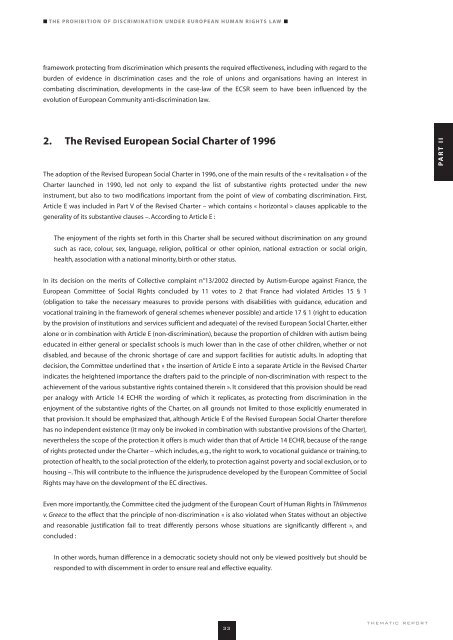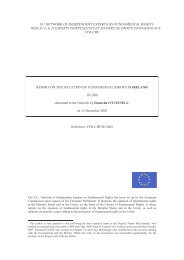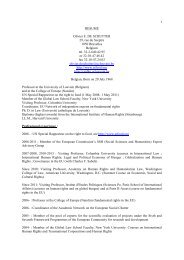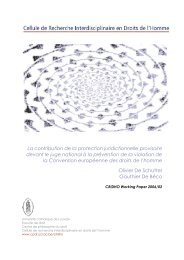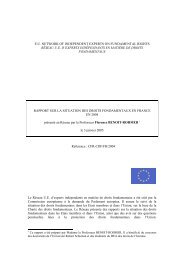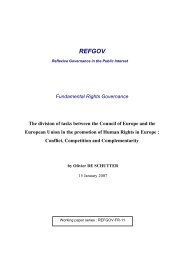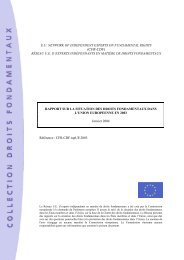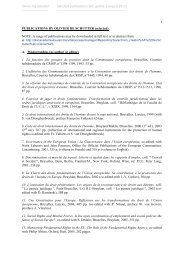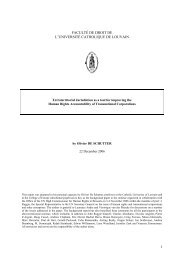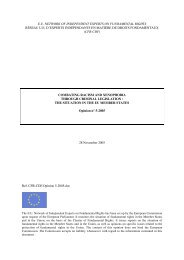The Prohibition of Discrimination under European Human ... - cridho
The Prohibition of Discrimination under European Human ... - cridho
The Prohibition of Discrimination under European Human ... - cridho
You also want an ePaper? Increase the reach of your titles
YUMPU automatically turns print PDFs into web optimized ePapers that Google loves.
■ THE PROHIBITION OF DISCRIMINATION UNDER EUROPEAN HUMAN RIGHTS LAW ■<br />
framework protecting from discrimination which presents the required effectiveness, including with regard to the<br />
burden <strong>of</strong> evidence in discrimination cases and the role <strong>of</strong> unions and organisations having an interest in<br />
combating discrimination, developments in the case-law <strong>of</strong> the ECSR seem to have been influenced by the<br />
evolution <strong>of</strong> <strong>European</strong> Community anti-discrimination law.<br />
2. <strong>The</strong> Revised <strong>European</strong> Social Charter <strong>of</strong> 1996<br />
<strong>The</strong> adoption <strong>of</strong> the Revised <strong>European</strong> Social Charter in 1996, one <strong>of</strong> the main results <strong>of</strong> the « revitalisation » <strong>of</strong> the<br />
Charter launched in 1990, led not only to expand the list <strong>of</strong> substantive rights protected <strong>under</strong> the new<br />
instrument, but also to two modifications important from the point <strong>of</strong> view <strong>of</strong> combating discrimination. First,<br />
Article E was included in Part V <strong>of</strong> the Revised Charter – which contains « horizontal » clauses applicable to the<br />
generality <strong>of</strong> its substantive clauses –. According to Article E :<br />
<strong>The</strong> enjoyment <strong>of</strong> the rights set forth in this Charter shall be secured without discrimination on any ground<br />
such as race, colour, sex, language, religion, political or other opinion, national extraction or social origin,<br />
health, association with a national minority, birth or other status.<br />
In its decision on the merits <strong>of</strong> Collective complaint n°13/2002 directed by Autism-Europe against France, the<br />
<strong>European</strong> Committee <strong>of</strong> Social Rights concluded by 11 votes to 2 that France had violated Articles 15 § 1<br />
(obligation to take the necessary measures to provide persons with disabilities with guidance, education and<br />
vocational training in the framework <strong>of</strong> general schemes whenever possible) and article 17 § 1 (right to education<br />
by the provision <strong>of</strong> institutions and services sufficient and adequate) <strong>of</strong> the revised <strong>European</strong> Social Charter, either<br />
alone or in combination with Article E (non-discrimination), because the proportion <strong>of</strong> children with autism being<br />
educated in either general or specialist schools is much lower than in the case <strong>of</strong> other children, whether or not<br />
disabled, and because <strong>of</strong> the chronic shortage <strong>of</strong> care and support facilities for autistic adults. In adopting that<br />
decision, the Committee <strong>under</strong>lined that « the insertion <strong>of</strong> Article E into a separate Article in the Revised Charter<br />
indicates the heightened importance the drafters paid to the principle <strong>of</strong> non-discrimination with respect to the<br />
achievement <strong>of</strong> the various substantive rights contained therein ». It considered that this provision should be read<br />
per analogy with Article 14 ECHR the wording <strong>of</strong> which it replicates, as protecting from discrimination in the<br />
enjoyment <strong>of</strong> the substantive rights <strong>of</strong> the Charter, on all grounds not limited to those explicitly enumerated in<br />
that provision. It should be emphasized that, although Article E <strong>of</strong> the Revised <strong>European</strong> Social Charter therefore<br />
has no independent existence (it may only be invoked in combination with substantive provisions <strong>of</strong> the Charter),<br />
nevertheless the scope <strong>of</strong> the protection it <strong>of</strong>fers is much wider than that <strong>of</strong> Article 14 ECHR, because <strong>of</strong> the range<br />
<strong>of</strong> rights protected <strong>under</strong> the Charter – which includes, e.g., the right to work, to vocational guidance or training, to<br />
protection <strong>of</strong> health, to the social protection <strong>of</strong> the elderly, to protection against poverty and social exclusion, or to<br />
housing –. This will contribute to the influence the jurisprudence developed by the <strong>European</strong> Committee <strong>of</strong> Social<br />
Rights may have on the development <strong>of</strong> the EC directives.<br />
Even more importantly, the Committee cited the judgment <strong>of</strong> the <strong>European</strong> Court <strong>of</strong> <strong>Human</strong> Rights in Thlimmenos<br />
v. Greece to the effect that the principle <strong>of</strong> non-discrimination « is also violated when States without an objective<br />
and reasonable justification fail to treat differently persons whose situations are significantly different », and<br />
concluded :<br />
In other words, human difference in a democratic society should not only be viewed positively but should be<br />
responded to with discernment in order to ensure real and effective equality.<br />
33<br />
thematic report<br />
PART II


